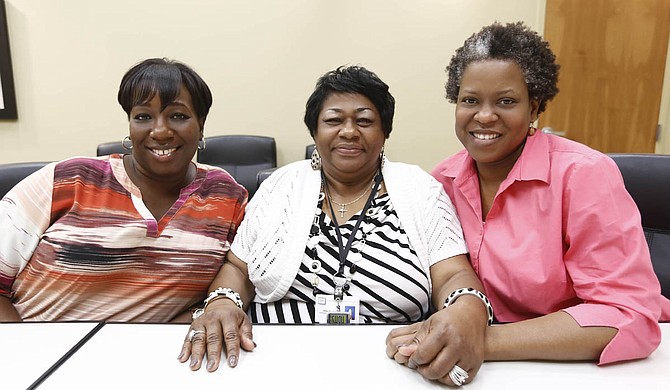Rhonda Davis, Willie Mae Berry and Talya Straughter (left to right) make up a part of the 170-person team at Hinds Behavioral Health Services. Photo by Imani Khayyam.
Some clients and their stories stay with Willie Mae Berry. Berry remembers one teenager who was referred through the state Department of Human Services after they took away her first child. The woman was pregnant with a second child and had nowhere to stay when she walked through the doors of Hinds Behavioral Health Services.
Berry, the coordinator of community services at HBHS, remembers the woman because one nurse practitioner at HBHS took off her shoes and gave them to the woman—who had walked in without shoes. Berry convinced a shelter to house the woman for free that night, because other shelters were closed for the evening. She left HBHS with shoes and a place to sleep that night.
"It took everything in me to keep the tears back because I (was) trying to put on my little professional face," Berry said.
"I couldn't go home until I made sure she was safe."
After-hours work and long nights are business as usual at HBHS. A staff of about 170 therapists, nurses, doctors and administrative staff work on 6,500 cases annually, serving residents of Hinds County who experience mental illness. The community mental health center, or "Region 9," is one of 14 Mississippi community health centers located throughout the state.
Region 9 is looking to expand its services into a "one-stop shop" for their clients, transitioning to integrated health care. According to Talya Straughter, coordinator of treatment services, HBHS has recently partnered with a primary-care doctor.
"Your mental state is what drives everything else in your body," Straughter said.
Executive Director Kathy Crockett said that eventually the clinic would like to add dental care, but for now providing some primary-care treatment for patients is what HBHS is focusing on.
Berry said HBHS needs more funding, especially to provide shelter and services to their clients. She said keeping track of clients, particularly those who can be defined as "chronically homeless" (including those who sleep on a relative's couch), can be difficult.
Anywhere between 50 to 100 cases at HBHS are homeless individuals that extended services and funding at Region 9 would benefit. HBHS was recently awarded the MH4R Grant (which stands for Mississippi Housing for Recovery) from the Mississippi Department of Mental Health, to help pay for services and intake costs of chronically homeless patients who cannot afford to pay or do not have the insurance to cover the costs, Crockett said.
"We have a systematic problem with the mentally ill not being tracked within the system," she said. "They are lost amongst some of the systems, but of course they know us, so they come back here."
HBHS gets referrals from myriad locations: schools, primary-care doctors, hospitals, social-service organizations (like Stewpot), the Mississippi State Hospital and the Department of Human Services. Some clients refer themselves. Region 9 receives funding through the Mississippi Department of Mental Health, Medicaid health care providers and private insurance companies.
Mental illness is a diagnosable illness that affects a person's thinking, emotional state and behavior. The stigma attached to mental illness in society has led the staff at HBHS to us a wellness-recovery model, letting each client define what wellness looks like for them.
"It's like a GPS," Rhonda Davis, a youth therapist at Region 9, said.
"Put the destination address in so we know where you want to go, and we'll help you try to get to that place."
For mental-health emergencies, dial 601-955-6381. Comment at www.jfp.ms.



Comments
Use the comment form below to begin a discussion about this content.
comments powered by Disqus